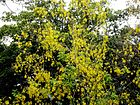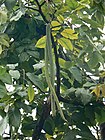Note: This is a project under development. The articles on this wiki are just being initiated and broadly incomplete. You can Help creating new pages.
Difference between revisions of "Cassia fistula - Aragvadha"
(→References) |
|||
| (18 intermediate revisions by 3 users not shown) | |||
| Line 1: | Line 1: | ||
| − | [[File:Konnamaram.JPG|thumb|right|'' | + | [[File:Konnamaram.JPG|thumb|right|''Cassia fistula'']] |
| − | + | '''Cassia fistula''' known as the golden rain tree. It is a flowering plant. The species is native to the Indian subcontinent and adjacent regions of Southeast Asia. It ranges from southern Pakistan eastward throughout India to Myanmar and Thailand and south to Sri Lanka. This tree is belongs to Caesalpiniaceae.<ref name="Plant family"/> | |
| − | '''Cassia fistula''' known as the golden rain tree | ||
| − | |||
==Uses== | ==Uses== | ||
{{Uses|Fever}}, {{Uses|Skin diseases}}, {{Uses|Rheumatic diseases}}, {{Uses|Cervical lyrnphadenitis}}, {{Uses|Cardiac diseases}}, {{Uses|Worm Infestations}}, {{Uses|Abdominal pain}}. | {{Uses|Fever}}, {{Uses|Skin diseases}}, {{Uses|Rheumatic diseases}}, {{Uses|Cervical lyrnphadenitis}}, {{Uses|Cardiac diseases}}, {{Uses|Worm Infestations}}, {{Uses|Abdominal pain}}. | ||
| + | |||
| + | ===Food=== | ||
| + | Cassia fistula can be used in food. Tender leaves and fl ower buds are cooked as vegetable<ref name="Forest foods of Western Ghat"/>. | ||
==Parts Used== | ==Parts Used== | ||
| − | {{Parts Used|Fruit pulp}}, {{Parts Used|Bark}}, {{Parts Used| | + | {{Parts Used|Fruit pulp}}, {{Parts Used|Bark}}, {{Parts Used|Root}}, {{Parts Used|Leaf}}, {{Parts Used|Flower}}. |
==Chemical Composition== | ==Chemical Composition== | ||
| − | + | Pulp of the pod contains anthraquinone glycosides, sennosides A and B, rhein and its glucoside, barbaloin.<ref name="chemical composition"/> | |
==Common names== | ==Common names== | ||
| − | {{Common names|sa=Krathamaala, Vyaadighata, Shampaaka|en=Indian Laburnum, Purging cassia|gu=Garamala, Garamalo|hi=Amaltas|kn= | + | {{Common names|sa=Krathamaala, Vyaadighata, Shampaaka|en=Indian Laburnum, Purging cassia|gu=Garamala, Garamalo|hi=Amaltas|kn= ಕಕ್ಕೆಮರ Kakkemara, ಕೊಂದೆ Konde|ks=Kriyangal Phali|ml=Konna, Kritamalam|mr=Bahava, Garamala, Amaltas|pa=Amaltas|ta=Sarakonrai, Sarak konnai, Sarak kondi, Sharakkonrai|te=Rela}}.<ref name="Common names"/> |
==Properties== | ==Properties== | ||
| Line 29: | Line 30: | ||
Recana | Recana | ||
===Prabhava=== | ===Prabhava=== | ||
| + | |||
| + | ===Nutritional components=== | ||
| + | Cassia fistula contains the Following nutritional components like Vitamin-E and C; Calcium, Iron, Magnesium, Manganese, Phosphorus, Potassium, Sodium<ref name="Forest foods of Western Ghat"/>. | ||
==Habit== | ==Habit== | ||
| Line 35: | Line 39: | ||
==Identification== | ==Identification== | ||
===Leaf=== | ===Leaf=== | ||
| − | {{Leaf| | + | {{Leaf|Alternate|Pinnate|20 to 40 cm long pinnate, leaflets in 4 to 6 pairs, colour greenish, ovate with numerous nerves}} <ref name="Leaf"/> |
===Flower=== | ===Flower=== | ||
| − | {{Flower|Unisexual|5 petals| | + | {{Flower|Unisexual|5 petals|Bright yellowish|10 stemens|Lax pendulous racemes flowering season February to April }} |
===Fruit=== | ===Fruit=== | ||
| − | {{Fruit| | + | {{Fruit|Cylindrical pod|30 to 45cm long|Brownish black in colour|Flat, testa very hard, smooth, numerous, present between the pulp|}} |
===Other features=== | ===Other features=== | ||
==List of Ayurvedic medicine in which the herb is used== | ==List of Ayurvedic medicine in which the herb is used== | ||
| + | * [[Manasamitra vatakam]] | ||
| + | * [[Maha Manjistadi kashayam]] | ||
| + | * [[Kushta rakshasa taila]] | ||
| + | * [[Maharasnadi kashayam]] | ||
| + | * [[Aragwadhadi kashayam]] | ||
| + | <ref name="Ayurvedic preparations"/> | ||
==Where to get the saplings== | ==Where to get the saplings== | ||
==Mode of Propagation== | ==Mode of Propagation== | ||
| − | {{Propagation| | + | {{Propagation|Cuttings}}, {{Propagation|Layering}}, {{Propagation|Vegetative}} |
| − | == | + | ==Cultivation Details== |
| − | Seed. The seeds have a hard seed coat and germination is improved by mechanical scarification or treatment with concentrated sulphuric acid for at least 45 minutes. | + | Seed. The seeds have a hard seed coat and germination is improved by mechanical scarification or treatment with concentrated sulphuric acid for at least 45 minutes<ref name="Cultivation details"/>. Cassia fistula is available through March- October<ref name="Forest foods of Western Ghat"/> |
==Commonly seen growing in areas== | ==Commonly seen growing in areas== | ||
| − | {{Commonly seen|Tropical area}}. | + | {{Commonly seen|Tropical area}}, {{Commonly seen|Dry deciduous forests}}. |
==Photo Gallery== | ==Photo Gallery== | ||
| Line 71: | Line 81: | ||
<references> | <references> | ||
| − | <ref name="chemical composition">[http:// | + | <ref name="chemical composition">[http://gbpihedenvis.nic.in/PDFs/Glossary_Medicinal_Plants_Springer.pdf Phytochemistry]</ref> |
| − | <ref name="Cultivation details">[https://pfaf.org/user/Plant.aspx?LatinName=Cassia+fistula | + | <ref name="Cultivation details">[https://pfaf.org/user/Plant.aspx?LatinName=Cassia+fistula Cultivation details]</ref> |
| − | <ref name=" | + | <ref name="Ayurvedic preparations">[https://easyayurveda.com/2012/12/26/aragvadha-cassia-fistula-uses-qualities-ayurveda-details/ Ayurvedic preparations]</ref> |
| + | <ref name="Common names">[https://sites.google.com/site/indiannamesofplants/via-species/c/cassia-fistula Common name]</ref> | ||
| + | <ref name="Plant family">Karnataka Aushadhiya Sasyagalu By Dr.Maagadi R Gurudeva, Page no:57</ref> | ||
| + | <ref name="Leaf">Kappatagudda - A Repertoire of Medicianal Plants of Gadag by Yashpal Kshirasagar and Sonal Vrishni, Page No. 110</ref> | ||
| + | <ref name="Forest foods of Western Ghat">"Forest food for Northern region of Western Ghats" by Dr. Mandar N. Datar and Dr. Anuradha S. Upadhye, Page No. Published by Maharashtra Association for the Cultivation of Science (MACS) Agharkar Research Institute, Gopal Ganesh Agarkar Road, Pune</ref> | ||
</references> | </references> | ||
| Line 81: | Line 95: | ||
* [http://www.planetayurveda.com/library/amaltas-cassia-fistula Cassia fistula on planet ayurveda] | * [http://www.planetayurveda.com/library/amaltas-cassia-fistula Cassia fistula on planet ayurveda] | ||
* [http://envis.frlht.org/plantdetails/b04cff8ef127a160c81ed40fbae69276/dbe4e18cf3bb9c8e80cc41366d7f3b09 Cassia fistula on envis centre on medicinal plants] | * [http://envis.frlht.org/plantdetails/b04cff8ef127a160c81ed40fbae69276/dbe4e18cf3bb9c8e80cc41366d7f3b09 Cassia fistula on envis centre on medicinal plants] | ||
| + | |||
[[Category:Herbs]] | [[Category:Herbs]] | ||
[[Category:Fabaceae]] | [[Category:Fabaceae]] | ||
Latest revision as of 11:22, 27 October 2021
Cassia fistula known as the golden rain tree. It is a flowering plant. The species is native to the Indian subcontinent and adjacent regions of Southeast Asia. It ranges from southern Pakistan eastward throughout India to Myanmar and Thailand and south to Sri Lanka. This tree is belongs to Caesalpiniaceae.[1]
Contents
- 1 Uses
- 2 Parts Used
- 3 Chemical Composition
- 4 Common names
- 5 Properties
- 6 Habit
- 7 Identification
- 8 List of Ayurvedic medicine in which the herb is used
- 9 Where to get the saplings
- 10 Mode of Propagation
- 11 Cultivation Details
- 12 Commonly seen growing in areas
- 13 Photo Gallery
- 14 References
- 15 External Links
Uses
Fever, Skin diseases, Rheumatic diseases, Cervical lyrnphadenitis, Cardiac diseases, Worm Infestations, Abdominal pain.
Food
Cassia fistula can be used in food. Tender leaves and fl ower buds are cooked as vegetable[2].
Parts Used
Fruit pulp, Bark, Root, Leaf, Flower.
Chemical Composition
Pulp of the pod contains anthraquinone glycosides, sennosides A and B, rhein and its glucoside, barbaloin.[3]
Common names
| Language | Common name |
|---|---|
| Kannada | ಕಕ್ಕೆಮರ Kakkemara, ಕೊಂದೆ Konde |
| Hindi | Amaltas |
| Malayalam | Konna, Kritamalam |
| Tamil | Sarakonrai, Sarak konnai, Sarak kondi, Sharakkonrai |
| Telugu | Rela |
| Marathi | Bahava, Garamala, Amaltas |
| Gujarathi | Garamala, Garamalo |
| Punjabi | Amaltas |
| Kashmiri | Kriyangal Phali |
| Sanskrit | Krathamaala, Vyaadighata, Shampaaka |
| English | Indian Laburnum, Purging cassia |
.[4]
Properties
Reference: Dravya - Substance, Rasa - Taste, Guna - Qualities, Veerya - Potency, Vipaka - Post-digesion effect, Karma - Pharmacological activity, Prabhava - Therepeutics.
Dravya
Rasa
Tikta (Bitter), Madhura (Sweet)
Guna
Guru
Veerya
Ushna (Hot)
Vipaka
Madhura (Sweet)
Karma
Recana
Prabhava
Nutritional components
Cassia fistula contains the Following nutritional components like Vitamin-E and C; Calcium, Iron, Magnesium, Manganese, Phosphorus, Potassium, Sodium[2].
Habit
Identification
Leaf
| Kind | Shape | Feature |
|---|---|---|
| Alternate | Pinnate | 20 to 40 cm long pinnate, leaflets in 4 to 6 pairs, colour greenish, ovate with numerous nerves |
Flower
| Type | Size | Color and composition | Stamen | More information |
|---|---|---|---|---|
| Unisexual | 5 petals | Bright yellowish | 10 stemens | Lax pendulous racemes flowering season February to April |
Fruit
| Type | Size | Mass | Appearance | Seeds | More information |
|---|---|---|---|---|---|
| Cylindrical pod | 30 to 45cm long | Brownish black in colour | Flat, testa very hard, smooth, numerous, present between the pulp | {{{6}}} |
Other features
List of Ayurvedic medicine in which the herb is used
- Manasamitra vatakam
- Maha Manjistadi kashayam
- Kushta rakshasa taila
- Maharasnadi kashayam
- Aragwadhadi kashayam
Where to get the saplings
Mode of Propagation
Cuttings, Layering, Vegetative
Cultivation Details
Seed. The seeds have a hard seed coat and germination is improved by mechanical scarification or treatment with concentrated sulphuric acid for at least 45 minutes[7]. Cassia fistula is available through March- October[2]
Commonly seen growing in areas
Tropical area, Dry deciduous forests.
Photo Gallery
References
- ↑ Karnataka Aushadhiya Sasyagalu By Dr.Maagadi R Gurudeva, Page no:57
- ↑ 2.0 2.1 2.2 "Forest food for Northern region of Western Ghats" by Dr. Mandar N. Datar and Dr. Anuradha S. Upadhye, Page No. Published by Maharashtra Association for the Cultivation of Science (MACS) Agharkar Research Institute, Gopal Ganesh Agarkar Road, Pune
- ↑ Phytochemistry
- ↑ Common name
- ↑ Kappatagudda - A Repertoire of Medicianal Plants of Gadag by Yashpal Kshirasagar and Sonal Vrishni, Page No. 110
- ↑ Ayurvedic preparations
- ↑ Cultivation details
External Links
- Ayurvedic Herbs known to be helpful to treat Fever
- Ayurvedic Herbs known to be helpful to treat Skin diseases
- Ayurvedic Herbs known to be helpful to treat Rheumatic diseases
- Ayurvedic Herbs known to be helpful to treat Cervical lyrnphadenitis
- Ayurvedic Herbs known to be helpful to treat Cardiac diseases
- Ayurvedic Herbs known to be helpful to treat Worm Infestations
- Ayurvedic Herbs known to be helpful to treat Abdominal pain
- Herbs with Fruit pulp used in medicine
- Herbs with Bark used in medicine
- Herbs with Root used in medicine
- Herbs with Leaf used in medicine
- Herbs with Flower used in medicine
- Herbs with common name in Kannada
- Herbs with common name in Hindi
- Herbs with common name in Malayalam
- Herbs with common name in Tamil
- Herbs with common name in Telugu
- Herbs with common name in Marathi
- Herbs with common name in Gujarathi
- Herbs with common name in Punjabi
- Herbs with common name in Kashmiri
- Herbs with common name in Sanskrit
- Herbs with common name in English
- Habit - Herb
- Index of Plants which can be propagated by Cuttings
- Index of Plants which can be propagated by Layering
- Index of Plants which can be propagated by Vegetative
- Herbs that are commonly seen in the region of Tropical area
- Herbs that are commonly seen in the region of Dry deciduous forests
- Herbs
- Fabaceae







